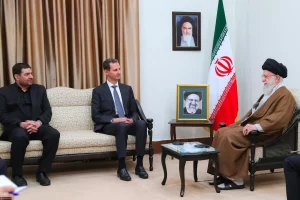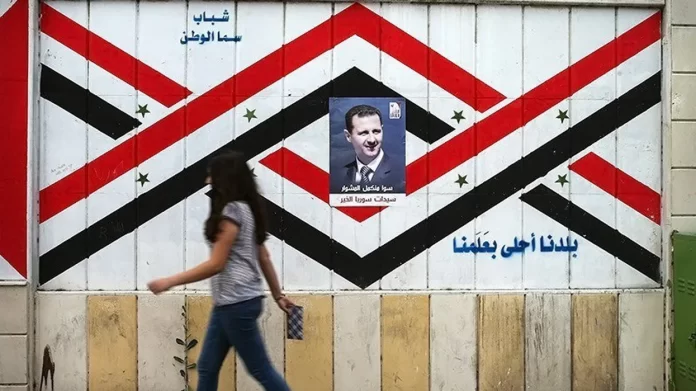While Iran and Russia helped the country’s iron-fisted ruler Bashar al-Assad suppress a popular uprising in 2011 and then resist a host of rebel militias, Russia is believed to be behind this change.
Yet Assad has continued to declare his friendship with Iran. On May 30, he was in Tehran to meet with Supreme Leader Ali Khamenei, presumably to present his condolences after the death of Iranian President Ebrahim Raisi, on May 19. Judging by their conversation, the two leaders were not in total sync.
Assad is never as effusive with Iranian officials as he is with Russian President Vladimir Putin. His sly pragmatism has not gone unnoticed in Tehran, which has invested vast sums, arms and men to keep him in power. Some Iranian politicians have a name for it: ingratitude.
A hands-off approach
In Tehran, Khamenei warned Assad about any rapprochement with the Arab world, reminding him that the West and its regional followers had sought to overthrow him by war and would now sideline him from regional dynamics with promises they would never keep. Assad appears to have listened without approving, before describing bilateral ties as strategic and nothing else.
Since Oct. 7, Syria has made every effort to keep out of the Israel-Hamas war. When Israel struck, on April 1, an Iranian consulate building in Damascus, that Iran said killed seven Iranians including a general of the Revolutionary Guards, Muhammadreza Zahedi, Syria merely protested the act.
The Russians, Saudis and Emirates also warned that Syrian involvement in Gaza could prove disastrous.
A former Syrian diplomat living in London, who asked not to be named, told Kayhan-London that Israeli agents met with Syrian envoys in an Arab state in November 2023 to make clear that any Syrian intervention in support of Hamas could lead to the Assad regime’s annihilation. The Assad regime took the warning seriously, the diplomat said, adding that the Russians, Saudis and Emirates also warned Assad that Syrian involvement in Gaza could prove disastrous.
Likewise, over the past two years, Syria has, for all intents and purposes, allowed Israel to strike Iranian or Hezbollah positions in its territory. This is despite being, on paper at least, a member of Iran’s regional Axis of Resistance to the Western powers and Israel. Indeed, it is the only Axis member not to have attacked Israel or allowed any attacks on it from its soil.
Not all Syrian regime officials have favored this hands-off approach, which has prompted changes in recent years inside Syria’s security apparatus, particularly after a senior security hand and opponent of Iranian influence, Rustum Ghazaleh, was killed in 2015. The changes involved placing partisans with better ties to the Arab world, not Iran, such as Ali Mamlouk, Kifah Melhem and others, to key security positions.

Returning to the Arab fold
London-based Syrian journalist Mahmoud Gilani told this Kayhan-London there are several reasons why Syria is distancing itself from Iran, including above all, Russia’s desire to curb the presence of the Revolutionary Guards in Syria.
It is under Russian orders, Gilani said, that Iran’s proxy forces have moved tens of kilometers away from the Israeli border and the Golan Heights, which prevents any action against Israel. Gilani says returning to the Arab fold was now a priority for the Assad regime, after a long period of estrangement and exclusion from all Arab bodies that began with the 2011 civil war.
Last year, Assad’s invitation to an Arab League summit marked the end of his ostracism of many years, as did his return to a second summit in Bahrain last May. Here, going against decades of Syrian policy toward Iran, Assad signed the League’s declaration backing the United Arab Emirates’ claim to three islands in the Persian Gulf held by Iran. The last time Syria did this was under Assad’s father, Hafez al-Assad.
Both Russia and Arab states have promised to spend big and invest in Syria’s reconstruction.
Both Russia and Arab states have promised to spend big and invest in Syria’s reconstruction if it distances itself from Tehran. Russia has promised to help restore security across Syria if Russian firms were given a privileged position in its oil industry. Before billions of dollars can flow into Syria — where the Assad regime currently controls 80% of the territory — these powers want security as well as an end to the presence of militias, notably those doing Tehran’s bidding.
In early May, the foreign ministers of Syria, Jordan, Saudi Arabia and Egypt discussed Tehran’s indirect contribution to regional turmoil at a meeting held in Amman. The Revolutionary Guards are now thought to have an indirect hand in criminal activities and drug smuggling from Syria into Jordan and the states of the Persian Gulf.
Tehran’s interests
Inside Iran, a growing number of politicians have been urging an end to the extensive support given to Syria. Some suspect that if Israel keeps hitting Iranian targets with precision, it was in part with the help of Syrian intelligence.
But there is not yet a consensus in Tehran over the Assad regime’s involvement. Does Assad know about secret information falling into Israeli hands, or has the Mossad penetrated Syria’s military and intelligence apparatus?
Tehran is also angry that Iran has been excluded from Syria’s reconstruction plans as well as from present business opportunities. The former head of the parliamentary national security committee, Hishmatullah Falahatpisheh, said Syria has done nothing to repay the $30 billion it owes the Islamic Republic, when it has been steadily settling its debts with Russia. The former legislator says Syria owes Iran the equivalent of an entire annual state budget.
To further prove the adage that states do not have friends, only interests, Falahatpisheh notes that Turkey, which has backed Assad’s opponents, still had more than $2 billion worth of trade with Syria in 2023 — 20 times more than Iran’s exchanges with its ally.
All rights reserved@WorldCrunch in Partnership with Kayhan.London


